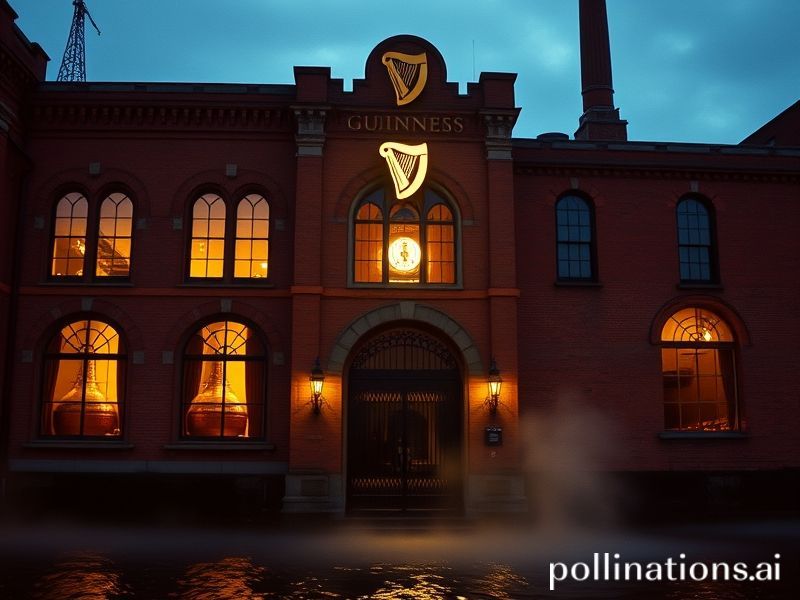Global Hangover: How the House of Guinness Conquered the Planet One Dark Pint at a Time
The House of Guinness: A Black-Pint Empire in a World That’s Already Had Too Much to Drink
By Our Correspondent, still sober enough to file copy
DUBLIN—If nations were measured by the froth on their exports, Ireland would be a superpower. And the House of Guinness—now a slick Diageo subsidiary masquerading as a 264-year-old family concern—still stands as the Emerald Isle’s most successful colonial experiment since the English discovered guilt. From Lagos to Lima, the harp logo is less a brand than a planetary semaphore: “Yes, we know it tastes better at 5 °C; no, we don’t know why your local pub keeps it at room temperature and calls it ‘extra cold’.”
Globally, 10 million pints of the black stuff are siphoned daily into mouths that can barely pronounce “Sláinte.” That’s 3.65 billion pints a year—roughly one for every adult who has ever muttered, “Just one more,” before waking up under a table in a time zone they didn’t know existed. The arithmetic alone is staggering: if you stacked all those pints, the tower would reach the moon and then immediately topple over because, frankly, gravity has standards.
But the House of Guinness is more than a brewery; it’s a soft-power Trojan horse wheeled into 150 countries. In Nigeria, Guinness Foreign Extra Stout—brewed locally with sorghum because even imperialism has to adapt—accounts for nearly half of Diageo’s African profits. Let that sink in: a drink invented to fortify 18th-century London porters now fortifies 21st-century Lagosian entrepreneurs against… well, other Lagosian entrepreneurs. In Malaysia, where alcohol taxes could fund a small space program, Guinness is marketed as “the premium stout for people who like paying rent late.” The brand’s genius lies in convincing every culture that the pint is indigenous. The Japanese think it pairs with yakitori; Jamaicans swear by Guinness punch at Christmas; and in America, craft-beer bros insist it’s “sessionable” while ordering 14% bourbon-barrel stouts that taste like liquid licorice regret.
The worldwide implications? Consider carbon footprints. Guinness claims it will be “carbon neutral” by 2030, which is corporate speak for “we’ll plant enough trees to offset your poor life choices.” Each pint currently generates 300 grams of CO₂—about the same as boiling a kettle 15 times or listening to one U2 album on repeat. Multiply by 3.65 billion and you have Ireland’s second-largest export after tax avoidance. Meanwhile, climate change is already shrinking barley yields, forcing brewers to contemplate a dystopian future where Guinness is brewed with lentils and the tears of marketing executives.
Then there’s the meta-narrative: Guinness as liquid heritage in an age when heritage is auctioned on NFT marketplaces. Tourists still queue at St. James’s Gate for the “pint with a view,” blissfully unaware that the skyline now includes Facebook’s European HQ—a building so sterile it makes the brewery’s 250-year-old vats look like artisanal hipster pottery. The Guinness Storehouse welcomes 1.3 million pilgrims annually, each paying €25 to learn that Arthur Guinness signed a 9,000-year lease in 1759, proof that even commercial real estate agents once had optimism. Visitors exit through the gift shop clutching €35 rugby shirts stitched in Bangladesh, a transaction so post-colonial it needs its own apology tour.
And yet, for all the cynicism, the House of Guinness endures because it sells the one commodity humans never tire of buying: a story with a foamy head. Every raised pint is a miniature ceasefire—between tribes, classes, ex-lovers awkwardly sharing a table. In Kyiv, a bomb shelter stocks Guinness for “morale.” In Sydney, lockdown-weary bartenders pour it as liquid nostalgia for a time when “lockdown” was just a plumbing term. Even the Taliban—no fans of fermentation—couldn’t prevent a black-market can from circulating in Kabul, proving that prohibition, like gravity, has loopholes.
So here we are, spinning on a warming rock, arguing over oat-milk lattes and crypto regulation, while an 18th-century stout quietly unites us in mild cirrhosis. The House of Guinness isn’t just a brewery; it’s a planetary coping mechanism, dispensed 20 oz at a time. Sláinte, humanity. Try not to spill it on the apocalypse.







